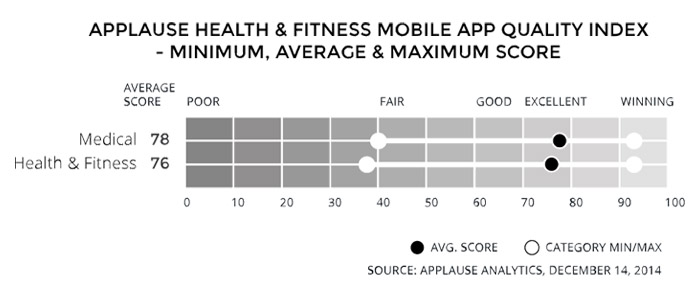Medical software and health/fitness apps are getting adopted by consumers, while achieving an average satisfaction score of 78 and 76, respectively, according to the inaugural “2015 State Of The U.S. Health & Fitness Apps Economy” ARC 360 report.
Said report was published by Applause, which looked at 39 health and fitness and 28 medical apps. The score ranking is split into five segments ranging from poor (0 to 39) to fair (40 to 59), good (60 to 69) to excellent (70 to 89), and the top “winning” tier that includes scores of 90 and above.
The report concludes that the key element to mHealth app success lies with listening to users and providing needed, useful tools.The top three high-scoring health and fitness tools were all menstruation tracking apps, landing very near to or in the “winning” ranking category. Four apps hit the elite level, getting a ranking of above 70 from more than 50,000 users – including FitNow’s Lose It and Fitness Keeper’s RunKeeper.
In the medical apps category, Taconic System’s Blood Pressure Monitor achieved a 90 score and Atomic Apps’ Diseases Medical Dictionary got an average score of 83. WebMD’s Webscape ranks much lower, with a score of 73, and was bested by Azumo’s Glucose Buddy: Diabetes Log, which scored a 76.
Surprisingly or not, some well-known brand name apps aren’t big favorites with consumers, with many of them scoring the “fair” rating. This segment includes Google’s My Tracks (59), Weight Watchers Mobile (54), Fitbit and Nike Fuelband (54 and 53 respectively).
The ARC 360 report concludes that the key element to mHealth app success lies with listening to users and providing needed, useful tools.
“For mHealth app developers that requires being intuitive, offering app stability, fast performance and response while all keeping customer information secure and private,” notes the report, recommending developers to engage with an intended user base as early as possible and monitor ongoing customer feedback.
[Via: FierceMobileHealthcare]
